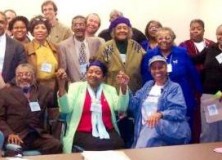The work of the SCRC is based in participatory methods and democratic processes. Our projects focus on expanding the opportunities and resources that communities command to create the future they envision.
The methods we employ value and make central the knowledge and perspectives of communities. Rather than using just one approach, or method, we draw from many types of research, organizing, and negotiation:
- Community Based Participatory Research (CBPR)
CBPR creates a fully participatory partnership between community members and technically trained providers. The community and researcher are equally important in the partnership, however, CBPR projects begin with community-defined questions.
- Participatory Action Research
Different methodologies fit under the umbrella term of Action Research. They all seek to improve the environments within a larger social organization by analyzing the reactions to the group’s habitual actions. Through each iterative process of the Action Research cycle, the parties find solutions to previously systemic problems within the workplaces or communities in question.
- Popular Education
Popular education, first formulated by Paolo Freire, is a pedagogic methodology that empowers individuals to act to affect change on the problems they face. These techniques allow citizens to correlate their personal experiences as individuals with larger societal problems.
- Dialogue Sessions
Dialogue sessions allow diverse groups of people with divergent viewpoints to establish common ground regarding a conflicting situation or common problem. The input from community members, stakeholders, leaders, and any other interested party allows a bigger, more dynamic definition of what’s at stake to unfold. This inclusive process sheds light on the best angle from which to approach finding a solution.
- Citizen Panels
Citizen Panels allow community members and other invested parties to participate in jury-style deliberations regarding issues that have a direct impact on their lives. Lay members of a population form a panel, listen to expert and lay testimony, deliberate, and give judgments on cases.
- Participatory Evaluation
Participatory evaluation is an approach to program evaluation. It provides for the active involvement of those with a stake in the program: providers, partners, beneficiaries, and any other interested parties. All involved decide how to frame the questions used to evaluate the program, and all decide how to measure outcomes and impact.
(Source: http://en.wikipedia.org/wiki/Participatory_evaluation)
- Alternative Dispute Resolution
Alternative Dispute Resolution techniques allow parties to reach mutually beneficial resolutions to issues, avoiding the need to resort to litigation. Usually mediated by a third party, the process allows the parties involved to share in the decision-making process. This third party has no stake in the outcome of the effort.

